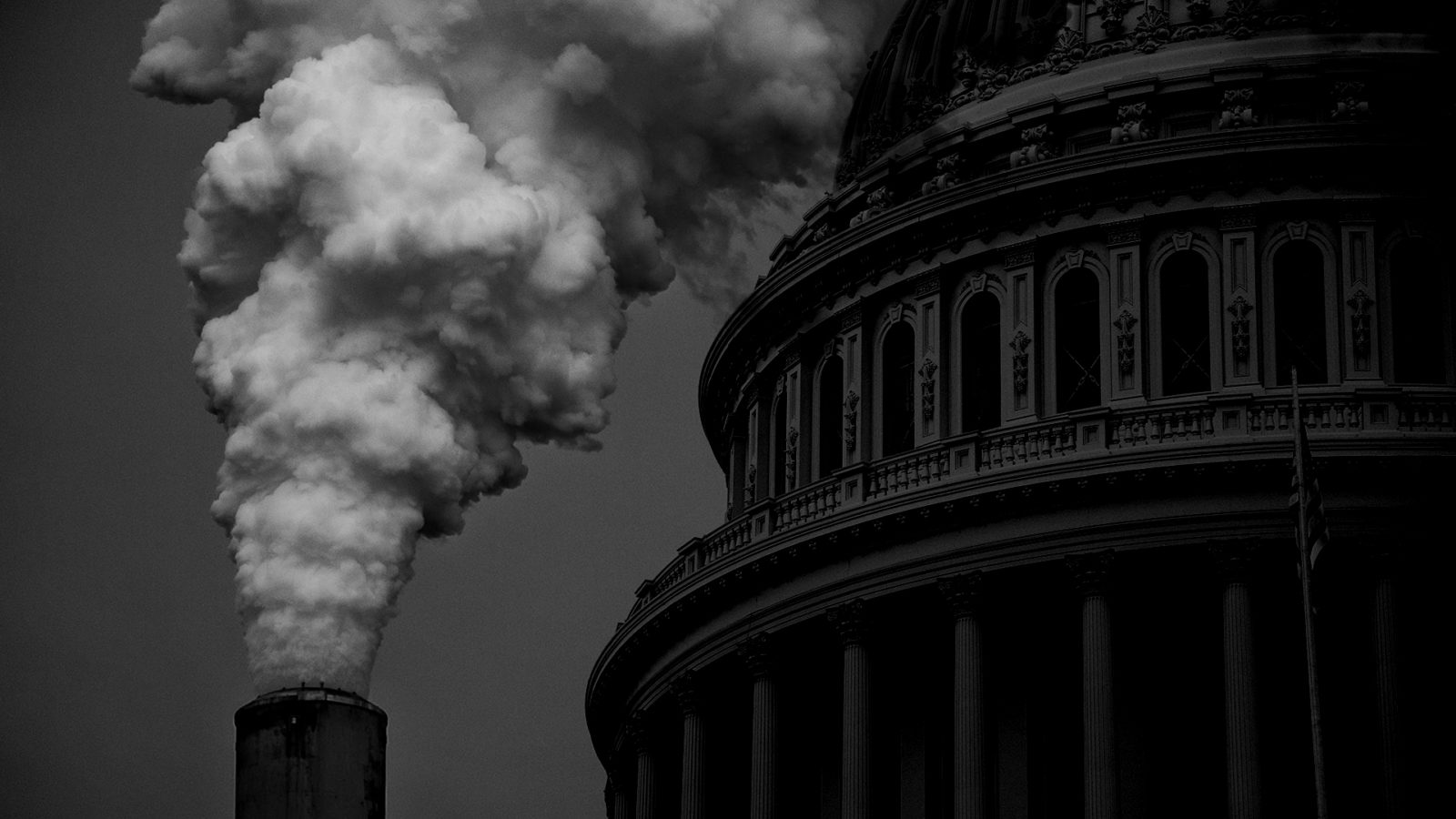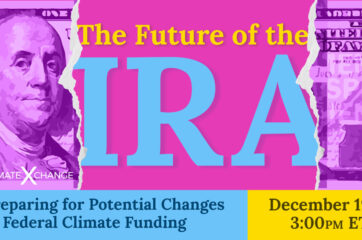For decades, the fossil fuel industry has attempted to influence and stifle the United States’ climate policies at both the federal and state level. The U.S. Chamber of Commerce — the largest dark money, pro-fossil fuel trade association in the country — has an extensive history of problematic behavior, including lobbying against climate legislation, supporting climate deniers, backing the fossil fuel industry, protecting polluters in court, and spreading misinformation about climate change. During the 2019-2020 election cycle alone, the group spent nearly $160 million on congressional lobbying.
This past June, a senior lobbyist from ExxonMobil — a member company of the U.S. Chamber of Commerce — was caught on film admitting to working with U.S. senators to push an anti-climate agenda. This raises the question: just how many senators and congressmen are allowing the fossil fuel industry to influence their decision-making? Many current congressional representatives have received funding from the Chamber, including during last year’s elections, as part of the fossil fuel industry’s ongoing efforts to push their agenda at the federal level.
Outside Spending and the Chamber of Commerce
The U.S. Chamber of Commerce is no stranger to funding political campaigns. As a dark money group, they are not required to disclose who they receive donations from, even when engaging in politics. In the 2019-2020 election cycle, nearly $700,000 was made in direct contributions by the Chamber to congressional campaigns. The Republican Party received the majority of this financial support, with 75% of funds going to GOP politicians. But the biggest impact was made through the category of outside spending, where the Chamber can assist politicians without coordinating with them directly. This type of funding is provided by associations, corporations, and unions that hope to influence an election in favor of a particular candidate by targeting voters through advertisements.
The 2002 McCain-Feingold Act sought to put limitations on how outside funding gets distributed. Although the bill was passed, it was only in effect for eight years before it was successfully challenged in 2010 after backlash from nonprofits, unions, and associations that found their donations stifled. The Supreme Court ruled in the Citizens United v. Federal Election Committee case that the First Amendment protects outside spending and can be given in unlimited amounts. This ruling means that the Chamber is able to not only supply money directly to a political candidate, but can also fund media advertisements for campaigns. Leading up to the November 2020 elections, the Chamber spent a significant amount supporting their endorsed politicians through television ads — totaling well over $5 million — in an effort to swing the Congress in favor of the fossil fuel industry.
A number of Republican senators in tightly-contested races — Susan Collins of Maine, Joni Ernst of Iowa, Roger Marshall of Kansas, Steve Daines of Montana, Cory Gardner of Colorado, and Thom Tillis of North Carolina — all benefited from positive ads in support of their elections. In addition, the Chamber chose to produce negative ads targeting Minnesota’s Senator Tina Smith (D) and Iowa’s Congressman Steve King (R). Ultimately, the Chamber racked up a seven-figure bill in TV advertisements across these seven states, leading to the victories of Republican senators Collins, Ernst, Marshall, Daines, and Tillis. A hefty $1.4 million from the Chamber was funneled into Maine, while $760,000 went to Iowa, $504,000 to Colorado, $500,000 to North Carolina, $500,000 to Montana, $490,000 to Minnesota, and $329,000 to Kansas — all of which is considered outside spending and not direct political contributions.
Chamber-Funded Politicians Have an Anti-Climate Agenda
Unsurprisingly, the six politicians the Chamber spent significant outside spending on have vocally supported the fossil fuel industry. Using the League of Conservative Voters’ National Environmental Scorecard, which calculates the voting records on environmental legislation by members of Congress, one can view their weak climate records.
Iowa Senator Joni Ernst (R) has voted for a mere four percent of pro-climate legislation during her years in Congress and criticized President Biden’s decision to cancel the Keystone XL pipeline. North Carolina Senator Thom Tillis (R), with a nine percent voting record, has also criticized President Biden for the same decision. Kansas Senator Roger Marshall (R) has a six percent voting record and introduced a bill that would have advanced the construction of the Keystone XL pipeline. Similarly, Montana Senator Steve Daines (R) has just a seven percent voting record and has insisted that fossil fuels have a future in American energy, signing on to the same bill introduced by Senator Marshall. Colorado Senator Cory Gardner (R) has an 11 percent voting record, reflecting his approval for the use of various fossil fuels. Maine Senator Susan Collins (R) has likewise shown support for the fossil fuel industry, specifically by voting to open the Arctic National Wildlife Refuge to oil drilling. The states that these politicians represent have also demonstrated inconsistent climate progress.
After November 2020, the Chamber continued its monetary involvement in elections by purchasing television advertisements to boost Georgia Republican Senate candidates Kelly Loeffler and David Perdue. If Loeffler and Perdue had been elected, this would have cemented the Republican majority in the Senate — which would align with the Chamber’s preferred outcome. Perdue was more outspoken in regards to his views on climate change. With a four percent voting record, he approved of Trump’s decision to remove the U.S. from the Paris Climate Accord and labeled the Green New Deal as a “socialist wishlist.” Loeffler, on the other hand, mostly avoided discussing her stance on climate change, but her loyalty to Trump suggests she approved of his administration’s anti-climate agenda. The Chamber spent over $1 million on advertisements to promote these Senate candidates before the run-off elections were held in January.
Scott Reed, a senior political strategist at the Chamber, admitted its personal investment in the November race, claiming that “the stakes of this election are very high for the business community.” This apparently includes villainizing pro-climate legislation, as an ad praising Senator Ernst’s opposition to the Green New Deal did when it claimed that the proposal is a “far-out scheme” that “must be stopped.”
The Chamber clearly has no qualms about using millions of dollars to influence U.S. elections by tipping the scale in favor of pro-fossil fuel candidates. The majority of these politicians will vote to protect the industry while sacrificing strong environmental regulations, and will be rewarded to do so. Evidence suggests that this is a recurring theme: the more a politician votes against pro-climate legislation, the more money they can expect from anti-climate forces like the fossil fuel industry. Senate Minority Leader Mitch McConnell (R), who has been repeatedly endorsed and funded by the Chamber, has a long history of resisting climate action and supports actions to promote fossil fuels and weaken environmental regulations. By monetarily supporting politicians such as McConnell, the Chamber is openly funding climate obstructors. This is clearly a significant barrier to passing meaningful and robust climate policy that the U.S. needs in order to achieve a more sustainable and prosperous future.
Youth Fight Back
Change the Chamber, a youth-led campaign started in 2020, is an environmental group whose mission is to call out the Chamber of Commerce’s behavior. The organization began as a way to put pressure on the Chamber to reverse its anti-climate lobbying, but soon expanded its goals once the team realized the Chamber’s extensive funding of climate-deniers. In response, they created a project to contact U.S. senators in order to push for pro-climate legislation. In an interview with Climate xChange, project leaders Steph Jordan and Evey Mengelkoch discussed the organization’s latest effort to combat the anti-climate lobbying being done by the Chamber.
What is the purpose of Change the Chamber’s Senate Outreach Project? What are your short-term and long-term goals?
Steph Jordan: The Senator Outreach Project was born [from] a recognition of the pertinence of this moment in the current legislative session for climate policy. With the understanding that the [Biden] infrastructure bill would contain significant climate components, and would potentially be the last chance at meaningful climate policy, we decided one of the best ways we could leverage our voices as climate advocates was to directly lobby for the passage of an infrastructure bill that contained the strongest climate components we could secure. We recognized that, as a coalition of young people from across the country and globe, we were uniquely positioned to leverage both the youth voice and the local constituent appeal in our meetings with senators.
Evey Mengelkoch: This summer is kind of like a perfect storm as far as being able to pass effective climate legislation goes, and the original American Jobs Plan with its climate and environmental justice proposals represented that. Next year is a midterm election year, COP26 is in the fall, and Biden just had a climate summit, rejoined the Paris Agreement, and released a new NDC (nationally determined contribution) this spring. Our short-term plan is to encourage the passing of climate legislation that would create an international example out of the U.S., feeding into more long-term momentum in continuing to achieve our national climate goals.
How do you feel about the Chamber’s history of funding climate-denying politicians?
Steph Jordan: Frustrated! Corporate funding of politicians will lead to the downfall of our democracy; it directly undermines the thesis that every individual’s vote and voice counts equally. It allows for politicians to justify and support policies that directly contradict the interests and needs of the people, instead serving the small group of corporate-stakeholders who funnel money into politicians’ pockets. With climate, this is especially severe, since so many corporations believe that addressing climate change will infringe upon their businesses’ profitability. Therefore, despite a majority of the American public on both sides of the aisle supporting tangible climate solutions, our policies continue to fail to reflect this. Because policymakers have distanced themselves from the interests of the people, consequently, policies themselves have diverged from responsiveness to the will of the people.
Evey Mengelkoch: I’m also very frustrated with it for similar reasons. The Chamber, its member corporations, and climate-denying politicians are prioritizing short-term corporate profits over our future. They are also threatening their own long-term profits by allowing climate change to worsen. Climate change is already causing mass migrations, deaths, and food and water shortages, and there’s no chance of improvement if drastic actions aren’t taken to cut our greenhouse gas emissions. I’m glad most people seem to be becoming more aware of climate change and those that perpetuate it, especially younger people of all political affiliations.
What do you believe youth should know in regards to how involved the fossil fuel industry is in our country’s politics, especially their lobbying efforts?
Steph Jordan: I think that youth should know that the fossil fuel industry, and corporate interests generally, really do run our political machine. Trade organizations like the Chamber of Commerce, which bring corporations together into coalitions where they have stronger bargaining and lobbying power, amplify the influence of these corporations. They enable them to collaborate and align interests.
Evey Mengelkoch: The fossil fuel industry is very pervasive in our political system. The fossil fuel industry and other corporations are given a lot of freedom to lobby on bills as they wish, especially since [the] Citizens United [ruling]. Corporations are allowed to not disclose certain political donations and run front groups, so I’m sure they have even more influence than we can publicly see. I’m glad we’re working to reveal these activities through Change the Chamber.
How do you feel about the chances of Biden’s infrastructure bill passing, especially in terms of funding for climate solutions?
Steph Jordan: It’s looking like some sort of bipartisan version of the bill is likely to go through, and a budget reconciliation package will follow later this summer. We are doubtful that the bipartisan version of the bill will contain climate stipulations on par with what we need, but we hope to move some significant climate wins through the reconciliation package (namely, some sort of carbon taxation plan and a clean energy standard).
Evey Mengelkoch: Like what Steph said, the bipartisan package seems most likely to pass with the Senate filibuster, and it has some climate spending, but not enough. Here is the full list of what will be done in the bipartisan bill. I’m hoping a more climate-focused bill will make it through reconciliation, but I’m nervous about Biden’s recent back-track. He had previously said that he would only sign the bipartisan package if a bill with more climate and family provisions was passed through reconciliation, then saying he would sign it without a reconciliation bill to appease more moderate Democrats and oppositional Republicans. While the bipartisan bill would be an improvement over nothing, I’m worried a reconciliation climate-focused bill might fail if enough congresspeople are satisfied with the bipartisan package.
Looking Ahead
Ultimately, the U.S. Chamber of Commerce financed the 2020 campaigns of many members of Congress who will likely work to obstruct the passing of pro-climate legislation. Through a significant amount of outside spending, the Chamber is able to promote its endorsed politicians on pro-fossil fuel and anti-climate platforms. Unfortunately, this is only a recent example of the fossil fuel industry’s attempt to protect its own interests at the expense of a more sustainable future. As Chamber members like ExxonMobil are publicly exposed for meddling in issues such as federal climate policies, the pressure must continue from activists who refuse to allow the fossil fuel industry to determine whether or not the country implements the climate policies it so desperately needs.









